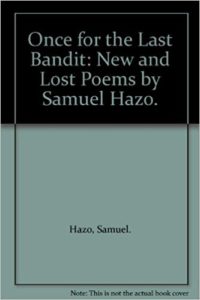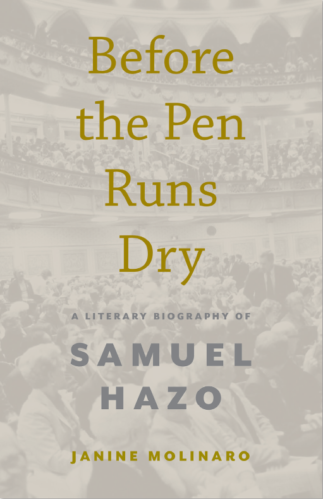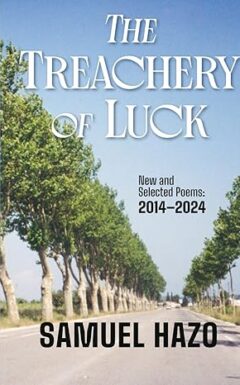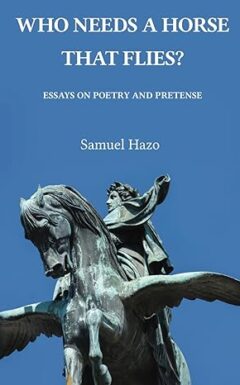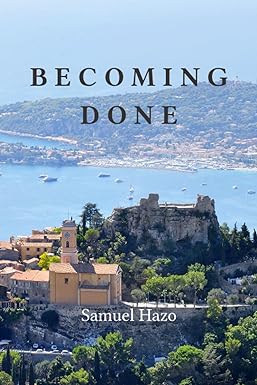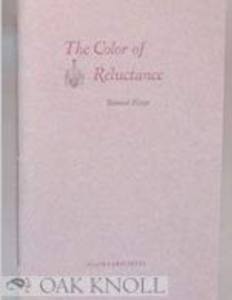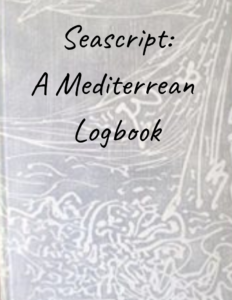Order your copy of this groundbreaking literary biography of Sam Hazo!
“Before the Pen Runs Dry” is an intimate portrait of Sam Hazo, the man who penned a lifetime of compelling and memorable poetry.
“Teacher, poet, writer, literary impresario, and above all devoted husband and father: Sam Hazo has lived a varied and consequential life. In Janine Molinaro, he has found an ideal biographer. ‘Before the Pen Runs Dry’ is an imaginatively conceived and exquisitely written book.”
– Andrew Bacevich, professor emeritus of history and international relations, Boston University.
Franciscan University Press
1235 University Boulevard | Steubenville, Ohio 43952
Most Recent Publications
The Treachery of Luck: New and Selected Poems: 2014–2024
Synopsis:
Wonder, outrage, grief, resignation, joy: From the fleeting perfection of a flowering almond to the incomprehensible carnage of the war in Gaza, these poems capture and distill every shade of human feeling. In this generous collection, Common Wealth Award winner Samuel Hazo has chosen the poems he thinks are his best from an extraordinarily productive decade, and then added a good number that have never been seen anywhere before. They put you in a comfortable chair for a good conversation with a master of the language, whose art lies in making you forget that there is any art in them at all.
Purchase Book on Amazon
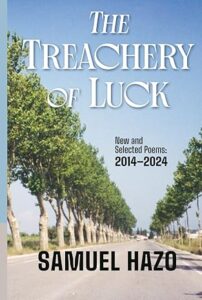
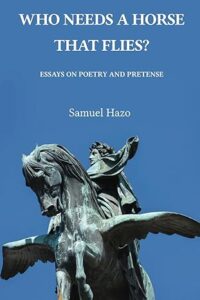
Who Needs a Horse That Flies?: Essays on Poetry and Pretense
Synopsis:
Samuel Hazo is known to the world of letters for his poetry and his fiction, but he’s also an incisive and observant essayist. In this collection we meet Hazo the critic, Hazo the observer, Hazo the traveler, Hazo the moralist, and above all Hazo the human being.
Purchase Book on Amazon
Becoming Done
Synopsis:
In Becoming Done, Samuel Hazo sees grief from a vantage granted to few—and speaks it clearly. Here he is at the height of his powers, which have always been formidable. This book displays all the art that has gathered an audience and earned him many honors over his lifetime, including a National Book Award nomination and his role as the first Poet Laureate of Pennsylvania.
Purchase Book on Amazon
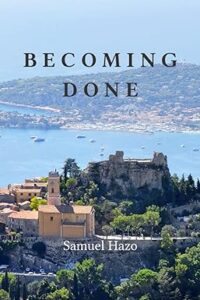
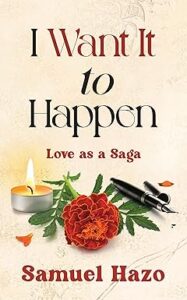
I Want It To Happen: Love as a Saga
Synopsis:
Love is not bound by the rules of time. When Halleluiah Quinn met Tonio Vargas, they knew this was forever. But when her doctor gives her a fifty-fifty chance of survival, Halleluiah has to learn just how much forever she can pack into right now.
Master poet, thoughtful essayist, captain in the Marine Corps, professor, and riveting novelist, Samuel Hazo was the first Poet Laureate of the Commonwealth of Pennsylvania. In this new novel, he tells a simple and moving love story with the wisdom of a philosopher and the urgency of a text message.
Purchase Book on Amazon
The Next Time We Saw Paris
Synopsis:
A new collection of poems by Samuel Hazo; the majority of which are published here for the first time. The New York Times Book Review wrote of Hazo as having “a gift for phrase-making and for incisive moral judgments,” and Richard Wilbur, the Pulitzer prize-winning poet, said “each of Hazo’s poems is a spare sparkling flow of good talk . . . one relishes his jauntiness, his ever-varied grammatical attack and the witty surplus of his phrasing.”
Purchase Book on Amazon
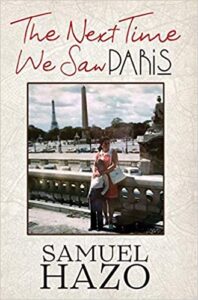
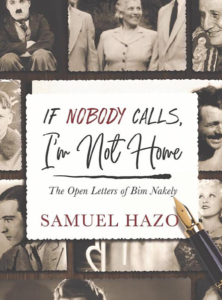
If Nobody Calls, I'm Not Home
Synopsis:
Bim Nakely, an outspoken single woman in her mid-seventies, has retired from her job as a seamstress. Having raised her niece’s two sons after her niece’s death and having lived to see both of them happily married, she now feels “unnecessary.” She has no regrets, but she cannot help feeling somewhat passe. Although her adopted sons and their wives revere her and stay in touch, she feels that her real purpose in life is behind her. To compensate for this void, she begins writing never-to-be-mailed letters to people she admired in her life—her niece Lottie, Franklin D. Roosevelt, Mae West, Pope John XXIII, Ernest Hemingway, Gypsy Rose Lee, Rita Hayworth, Charlie Chaplin and others, all of whom possessed a unique courage to face challenges and survive them. Bim’s letters to them reveal her inner struggles with similar challenges against the background of events and changes in the United States and the world during the middle decades of the twentieth century. It takes several unexpected happenings to make Bim realize that she, like everyone at any age, can still become suddenly necessary in ways she never expected or imagined.
Purchase Book on Amazon
When Not Yet is Now
Synopsis:
Samuel Hazo has won acclaim for his novels, plays, essays, and memoirs, but he is best known for his poetry. This is his thirtieth collection of poems.
In When Not Yet Is Now, as in all his work, Hazo finds the quiet nobility in the quotidian. He speaks with subtlety and humor about the stuff of ordinary life and inevitable loss.
Hazo served as Pennsylvania’s Poet Laureate from 1993 to 2003. He has won many awards and holds twelve honorary doctorates. Poet Dana Gioia notes that he “has been a constant and positive presence in the American poetry world for over half a century.”
Two-time Pulitzer Prize winner Richard Wilbur praised Hazo’s poems as “a spare, sparkling flow of good talk . . . utterly engaging.” (Franciscan University Press, April 2019)
Purchase Book on Amazon
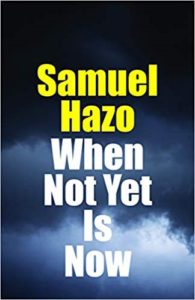
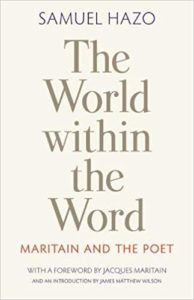
The World within the Word: Maritain and the Poet
Synopsis:
This book, originally written in 1957, arises from the encounter of two men: the American poet Samuel Hazo and the French philosopher Jacques Maritain. They met on September 12, 1956, at Maritain’s home in Princeton, New Jersey. Hazo sought to engage Maritain’s diffuse writings in aesthetics by bringing them into conversation with the great voices of the English literary tradition, especially Samuel Taylor Coleridge, Gerard Manley Hopkins, and John Keats. At the time, Hazo was also striving to articulate his own experience of the creative process. Then at the beginning of his writing life, he would later emerge as a leading voice in American poetry. The World Within the Word is the only book about Jacques Maritain for which Maritain himself wrote a foreword.
Review:
“Samuel Hazo’s book invites us to engage with the thought of Jacques Maritain in reflecting on the relationships among philosophy, faith, beauty, and artistic expression. It is a timely book for our age, which is so devoid of wonder, hope, and transcendence.”
-Rev. John I. Jenkins, CSC, President of the University of Notre Dame
Purchase Book on Amazon
The Pittsburgh That Stays Within You
Synopsis:
It has been called Pittsburgh’s memoir—this book of essays that reveals the soul of the city and the sensibilities of its author. Hazo suggests that “Pittsburgh did not arrive at its present status like Venus on the half shell, but its present grew out of its past. That past exists in our collective memory if it exists at all. One of Aristotle’s successors noted in passing that the past is all we have. He was only half right. We have the present that the past made possible. This memoir is one man’s view of that possibility.” Samuel Hazo’s work in this new edition is accompanied by the exquisite photographs of sixteen-year-old Paige Crawley.
Review:
“Having grown up in Pittsburgh in the 1970s and 80s, I thoroughly enjoyed Hazo’s descriptions of the Pittsburgh I knew then. The second person pronouns were especially effective for me. At many points as I read, I imagined this was a memoir of my life, and when a description not in keeping with my memories appeared, I was a bit surprised. This is the first I’ve read of Hazo’s prose (his poetry is some of my favorite), and I can see myself returning to this book for a reread in the near future.”
-GoodReads User
Winner of the 2018 Bronze Medal for Creative Nonfiction from the Independent Publishers Book Awards, one reader said, “I just finished reading your book, and what you did was write the story of my life.”
Purchase Book on Amazon

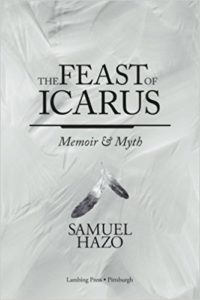
The Feast of Icarus
Synopsis:
Samuel Hazo’s voice is distinctive in contemporary American poetry. In some sixty years of writing, he has produced thirty collections praised by critics and fellow poets. In The Feast of Icarus, this master of the lyric turns to prose poems as he surveys his life and art. In more than a hundred blocks of type – each alive with sensation and good sense – Hazo gives voice to a whole life, with all its ordinary love, labor, desire, and grief.
Review:
“On page after page, these poems in prose (proems) by Samuel Hazo will say things to readers – and especially poets – that they will relish and remember.”
-Richard Wilbur, former U.S. Poet Laureate, two-time winner of the Pulitzer Prize
Purchase Book
Outspokenly Yours
Synopsis:
All but a few of these essays were originally published in the Pittsburgh Post-Gazette. The remaining few appeared in the Washington Report and the Notre Dame Magazine.
The majority of these essays reveal Samuel Hazo’s reaction to and estimate of the nation we have become from the turn of the century until now.
Review:
“Outspokenly Yours showcases the special talents that have distinguished the work of Sam Hazo over the course of his long and celebrated career. There is an inspiring artistry to his use of language that, even in prose, is entirely conssitent with his designation as a poet laureate. He is also a thought-provoking champion of strong opinions on a wide range of important topics. That combination of qualities is well-served by a collection of short commentaries, because the reader is given frequent opportunities to reflect, both on each message itself and on the skill with which that message has been presented.”
-Mark Nordenberg, Chancellor Emeritus and Institute of Politics Chair, University of Pittsburgh
Purchase Book on Amazon
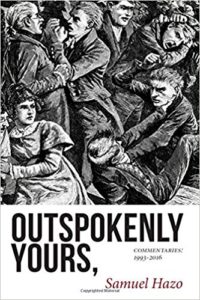
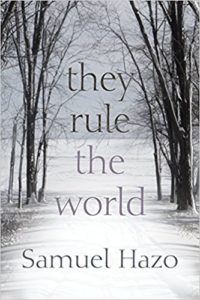
they rule the world
Synopsis:
For over fifty years, Hazo’s poetry has meditated on themes of mortality and love, passion and art, and courage and grace in a style that is unmistakably his own. In this new collection, he offers his most candid reflections on the passage of time and the tenderness of the present moment. By turns convivial and introspective, these poems explore the complex synchronicity between life and art, and the connections between the personal and the political. With sharp clarity and deep emotion, Hazo continues his pursuit of wisdom and discovery through the act of expression.
Review:
“These poems are engaging, personally warm, and stylistically poised, cultured, and full of concern for family and friends. The candid voice of a man preoccupied with mortality and delighted with the details of life among those he loves is an exemplary pleasure.”
-Brooks Haxton, author of They Lift Their Wings to Cry
Purchase Book on Amazon
And the time is
Synopsis:
In this work, Hazo casts his eye back over a career devoted to poetry. With works that are arranged loosely around the themes of love, family, and aging, this volume affirms Hazo’s status as one of the most compelling and enduring poets of his generation. Poems in this collection include works that have appeared in the Hudson Review, Prairie Schooner, the New York Times, and the Saturday Review.
Review:
“Samuel Hazo’s poems combine reality with imagination and grace. The combination produces both comprehension and wisdom.”
-Ralph Nader
Purchase Book on Amazon
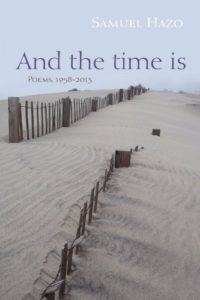

Sexes: The Marriage Dialogues
Synopsis:
The poems in Samuel Hazo’s Sexes: The Marriage Dialogues are concerned with how husbands and wives confront each other at life’s various intersections—sometimes casually, sometimes profoundly. It is at these points that the most interesting differences in gender reveal themselves. From the first poem (“Banterers”) to the last (“Ballad of the Old Lovers”) Hazo’s attuned ear picks up quotidian conversational exchanges, but the words are never window dressing. They hint at inevitable insights and misunderstandings born out of conjugal love. Each poem is a vignette of the moving and surprising moments that are married life.
Review:
“Hazo’s poems challenge readers to consider worry as a form of love and present a question of sex and love without each other. His poems evoke the idea of being right versus certain, and when to start trusting someone. Instead of defining myths of women’s and men’s roles in dating, these poems share honest reactions between the sexes through daily tasks that make a life together meaningful. The poems’ formats assist readers in a paced and, at moments, swift reading.”
-Shauna-Maria Andolina, Arcadia University
Purchase Book on Amazon
Like a Man Gone Mad
Synopsis:
Hazo, National Book Award finalist and former State Poet of Pennsylvania, transports the reader with poems of both lament and celebration in his sensual new collection. Like a Man Gone Mad features much of the spare yet precise imagery of his earlier work. Searing portraits, a deft use of allegorical language, and a wry sense of humor are all signatures of Hazo’s unique voice. Taking up the theme of time, the poems carry the reader back and forth through personal and historical time, offering glimpses of a wide range of figures, from Pascal and Heraclitus to John F. Kennedy and Clark Gable. From each vantage point, Hazo meditates on themes of vitality and longevity, legacy and oblivion, and the enduing folly of both the individual and society. Accessible and eminently readable, the poems in Like a Man Gone Mad embody a rich intellectual and emotional curiosity.
Review:
“This is poetry of maturity, of wisdom… A beautiful book distilled from years and years of living and writing.”
-Adam Zagajewski, author of Without End: New and Selected Poems
Purchase Book on Amazon
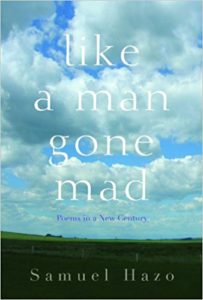
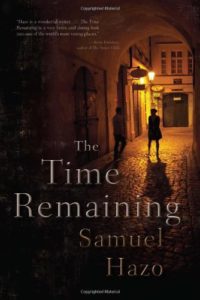
The Time Remaining
Synopsis:
A modern-day political thriller, The Time Remaining grapples with murder, romance, and international politics. Dodge Didier Gilchrist, a Pulitzer Prize-winning journalist and consummate ladies’ man, finds himself embroiled in an international conflict when his former college roommate, Palestinian scholar Sharif Tabry, is killed under mysterious circumstances. Tabry’s niece, Raya, who has been recently released from incarceration in Israel, begins working for Gilchrist in Washington D.C. When she is injured while trying to save Tabry, Gilchrist quickly discovers he has deep feelings for her.
Gilchrist embarks on a wild ride from Washington to Israel and Palestine as he learns from both Israelis and Palestinians of the suffering of Palestinians under occupation. This spurs an investigation that leads him up the ranks of the Israeli government and into a series of dangerous events. A fast-paced, suspenseful novel, The Time Remaining will keep readers absorbed in Gilchrist and Raya’s growing romance and intrigued by the exciting political drama that wrestles with the complexities of the Israeli-Palestinian conflict.
Review:
“The book speaks with human emotion… The most outstanding and moving metaphor in the book was his description of two patriots- one a Palestinian, the other an Israeli- lying side by side in death. The Time Remaining… will, of course, be somewhat painful for some to read. And that’s a very good thing.”
-Rabbi Mark Belzer, Rabbi Emeritus of Congregation Mickve
Purchase Book on Amazon
The Stroke of a Pen
Synopsis:
The Stroke of a Pen is a collection of occasional essays on a variety of subjects, from the relationship between poetry and public speech, to the pursuit of the literary life, to reading within a cultural context governed by power relations. Two essays focus on religion and literature, and the final five include a literary travel essay on Provence, a counterpointing one on the virtues of not traveling but remaining home, a lighter essay that extends the discussion of home to houses, a memory piece on the actor Gregory Peck, and a personal reflection on the author’s retirement. Throughout, Hazo is belletristic in his approach, calling on such writers as T.S. Elliot, Wilfred Owen, Jacques Maritain, and Nathan A. Scott, Jr., who deeply influence Hazo’s thinking and writing in this entertaining collection.
Review:
“Samuel Hazo’s The Stroke of a Pen offers a grand tour from classroom to classics, from the hazards of household plumbing to the pleasures of Provence. He remarks that ‘the chief value of travel for me is the deeper appreciation it gives me of home,’ yet reading these elegant essays leaves the reader with what Hazo realized away from home: ‘a different sense of your very self- a more resonant one, as if you’ve suddenly been underlined for emphasis.’”
-George Dennis O’Brien, President Emeritus, University of Rochester
Purchase Book on Amazon
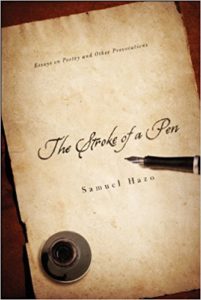
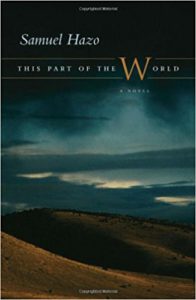
This Part of the World
Synopsis:
Premier Caseres rules his country with a ruthlessness that puts him in the elite category of Trujillo, Mugabe, and Kim Jong Il. A potent orator with a martinet style of leadership, Caseres’s ability to instill fear and reverence in his people has secured his place in power. However, the dictator’s human frailties run as deep as his stoicism. He is plagued with a heart condition that keeps him popping “pills like pistachios” and a son and heir to his leadership who has a taste for fast cars and little else. Finally, his devotion to Magdalena, his mistress, threatens to disrupt his unchallenged autocracy.
This Part of the World traces a new path into the heart of darkness. Samuel Hazo offers the reader an intrepid portrait of conscience, charisma, and the slow corruption of the human spirit. Hazo writes with a steely clarity and sharp satirical edge, bringing to life his tragic subject and illuminating the fate of a nation.
Review:
“Samuel Hazo spins a spellbinding epic… This Part of the World is a tale for our times; of war versus idealism, greed versus self-sacrifice, stupidity versus cunning. Unforgettable, insightful, wise, Hazo’s new novel is a thrilling, chilling read.”
-Valerie Hemingway, author of Running with the Bulls
Purchase Book on Amazon
The Song of the Horse
Synopsis:
A collection of Hazo’s selected poems spanning 50 years. Tackling themes of family, faith, and war, Hazo writes with immense lyricism and humanity.
Review:
“Samuel Hazo’s new book brings us once again, in poem after poem, the flow of thought in a lively mind. His work is meditative and yet, because of its humane warmth and wit, it seems continually shared. I enjoy the variety of his sentences as they move in the best sort of broken-field running, down the page… It is good to have this fresh selection of Hazo new and old.”
-Richard Wilbur
Purchase Book on Amazon
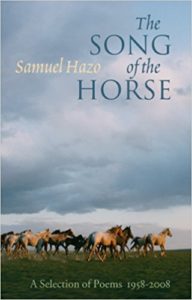
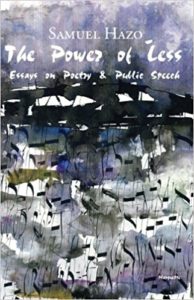
The Power of Less
Synopsis:
From the time of the earliest cultures to the present, poets have been seen as the most reliable witnesses because they are not only veritable ‘seers’ of the exterior and interior world, but they are able to convey their experience of it to others in language. And such expressions present us with visions of the world within and the world without that are not only particular to each poet but are also capable of being shared by us. Somehow this experience transforms our outlook and our very values in ways that nothing else can do.
The greatest poets in history have endured because their expressed visions have helped us see and feel those things that are permanently true of the human condition. In our era when so much of what passes for poetry is really sociology, ideology rhetoric or mere wordplay, it is well to be reminded of the fact that great poetry is more- much more- than that. Whether it inspires insight or wonder, visionary poetry is more than a different use of language. It is another language-a language that always manages to outlive its authors, its circumstances and the time of its creation. Poems come into existence out of absolute and unavoidable and largely inexplicable necessity. They are ongoing presences, and ongoing presences have no past tense because they always exist in the now. In this sense, Ezra Pound noted, all literature- if it is literature at all- is contemporary.
Each of the essays in this book deals with some aspect of poetry’s visionary nature- its awe-inspiring impact; its reliance upon feeling as being more dependable a for of knowledge than the conclusions of science or discursive reason; its capacity to convey the mysterious so that the final result is not mere pleasure but wisdom; its essential difference from mere verse; its challenge to translators who struggle to re-create in one language what is poetically present in another; its capability of inspiring poets to spring the locks of falsifying or stultifying forms of expression in order to say what they feel and see as they actually felt and saw it.
Purchase Book on Amazon
A Flight to Elsewhere
Synopsis:
In powerful and wide-ranging poems, Samuel Hazo speaks of his love for family and his roots in the Middle East.
Review:
“To encounter Samuel Hazo’s voice anywhere is to feel grounded and recharged with the vigor of life.”
-Naomi Shihab Nye
Purchase Book on Amazon
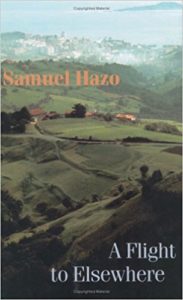
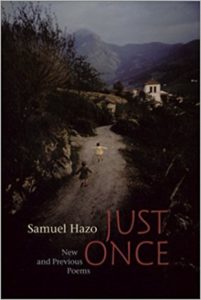
Just Once
Review:
“Readers searching for the elusive good in contemporary verse will be rewarded by a look into these pages.”
-Robert McDowell, The Hudson Review
Purchase Book on Amazon
The Holy Surprise of Right Now
Synopsis:
From his first book, through the National Book Award finalist Once for the Last Bandit, to his newest poems, Samuel Hazo’s themes have remained consistent. With each collection he wonders anew at the persistence of mortality in the midst of vibrant living and of love in all our relations. In his lithe, metrical lines, he writes with equal ease of Geneva, Switzerland or Johnstown, Pennsylvania; of the matador Manolete in his dying moments or the innocent eyes of an eleven-year-old son; of the rewards of creating great art or the frustrations and joys of driving a Roosevelt Coupé. With The Holy Surprise of Right Now, Hazo gives his readers a powerful summation gathered from forty years of work.
Review:
“Sam Hazo has perfect pitch, taking the experiences of everyday life and translating them into songs at once familiar and surprising. Each poem has a word or phrase or image that arrests you—sometimes knocking the wind out of you, sometimes causing a smile of recognition, but always making the thought behind the art immediate and as deeply felt as a dream.”
-Jane Alexander, former Chairman, National Endowment for the Arts
Purchase Book on Amazon
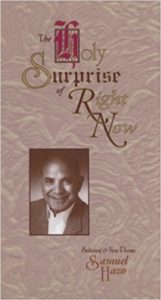
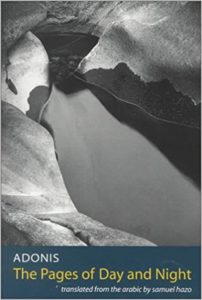
The Pages of Day and Night
Synopsis:
Calling poetry a “question that begets another question,” Adonis sets into motion this stream of unending inquiry with difficult questions about exile, identity, language, politics, and religion. Repeatedly mentioned as a possible Nobel laureate, Adonis is a renowned critic and writer of prose as well as a leading figure in twentieth-century Arabic poetry.
In The Pages of Day and Night, Adonis’s dazzling poetic gifts are on display, showing why one critic said of him, “Adonis is the writer with the greatest influence in Arabic poetry today… A rebel and force of destruction, but also a force of positive rejection and with a tormenting love for his culture and his country, he is certainly one of the greatest poets in the history of the language.” Restless and relentless, Adonis explores the pain and otherness of exile, a state so complete that absence replaces identity and becomes the exile’s only presence. Exile can take many forms for the Arabic poet, who must practice his craft as an outsider, separated not only from the nation of his birth, but from his own language; in the present as in the past, that exile can mean censorship, banishment, or death. Through the poems in The Pages of Day and Night, Adonis gives an exquisite voice to the silence of absence.
Review:
“[Adonis] writes from a profound understanding of and love for the Arabic culture from which he has been politically exiled. His poems are passionate, tragic, lyrical, evocative… The translations, unlike many, stand on their own as poems.”
-Northwestern University Press
Purchase Book on Amazon
Stills
Synopsis:
A haunting and powerful novel of love in the storm of 1980s terrorist politics, Stills brings us to the core of one photographer’s shattering experience in Beirut, revealing the heart of his very personal and dangerous profession.
When Louise, a young film producer, takes on the job of documenting the life of boy wonder photojournalist Bede Baxter, he has been missing in Lebanon for three months and is presumed dead. When she visits his house and puts herself in the midst of his most private concerns, she imagines she is in love with him: his talent, his sometimes cold, sometimes sensitive reporter’s soul. That is, until the unexpected happens.
The scene is then set for an unusual relationship, as Louise shifts the focus of her documentary from Baxter’s life to his continued search for the “perfect” photo. In reaching for that elusive, career-making picture, Baxter is willing to risk his life—and, it soon becomes clear—Louise’s as well.
Review:
“Stills captures the poetry of photography and the spirit that drives journalists who cover war. In the process, it grapples with the essential human dilemma of those who view war’s compelling tragedy through the prism of a lens.”
-Larry Pintak, former CBS correspondent in Beirut and author of Beirut Outtakes
Purchase Book on Amazon
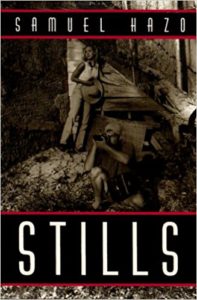
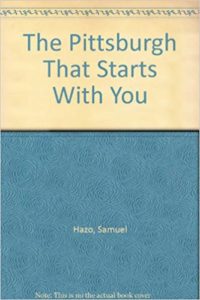
The Pittsburgh That Starts With You
Synopsis:
Called the most livable city in the United States by a Rand McNally rating committee, Pittsburgh seemed to wear the mantle lightly, if at all. Of course, civic leaders and others were euphoric, but the indigenous Pittsburgher shrugged, smiled and went on with his life. Shortly after the rating was announced, the Pittsburgh Post-Gazette conducted a survey in which Pittsburghers were asked to suggest ways in which ‘the number one city’ could be made more attractive for tourists. Answers ranged from planting azaleas on Mt. Washington’s slopes to expanding the new but small subway system. One respondent said without apology that nothing at all should be done to make Pittsburgh attractive for tourists since Pittsburgh was not a city that revealed itself readily to tourists but only to residents. And that for her was that.
Existentially speaking, Pittsburgh seems to have a nature that is non-distortable. While some cities strive to be what they once were or what others think they should be, Pittsburgh is in conflict with no false images of itself. In short, it is not competitive with itself. Los Angeles obeys an almost amoeboid principle of growth. New York is at the mercy of power plays and over-population, and you have the feeling that all of its celebrated endorsers who tell you that they love it from airport posters across America are the same people who look over their shoulders when they return to their hotels or apartments after midnight. Miami is two cities at once, and Dallas abounds in instant neighborhoods. Pittsburgh seems to keep its character intact through phases of change. The facades are different, but the faces of people and things have an obdurate persistence about them. The real character of the place, like the resilience of its native population, is consistently in the process of defining itself when tested by life’s vagaries or by time itself. Each testing redefines it in the same way that suffering redefines and re-etches a human face without changing it. In this way, Pittsburgh remains Pittsburgh.
Purchase Book on Amazon
Thank A Bored Angel
Synopsis:
Thank a Bored Angel: Selected Poems by Samuel Hazo brings together the poetry of twenty-two years, drawn from eight previous volumes. Assembled here are selections from Discovery (1959), The Quiet Wars (1962), Listen with the Eye (1964), My Sons in God (1965), Blood Rights (1968), Once for the Last Bandit (1972), Quartered (1974), and To Paris (New Directions, 1981). In his preface, Hazo affirms that “each of these poems touches on themes that are still alive in me—alive in that they seem inexhaustible”; all are rendered in the poet’s own voice, not “in what is irritatingly called a ‘persona,’” and none, he says, either when originally composed or now, could be expressed differently.
Casting back to the adventures and attachments of half a century, Thank a Bored Angel presents varied, colorful portraits from the poet’s life—as father, son, brother, husband, traveler, army lieutenant, university professor, writer. It is emotion, fancy, speculation—the reflections cast in his mind by events and “accidents of place”—that give them weight. Likewise, Hazo’s considerable passion and stylistic range are not flaunted but, measured by conscience and intent, constitute the poems’ inimitable, penetrating lyricism.
Purchase Book on Amazon
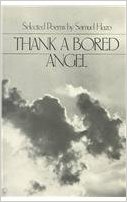
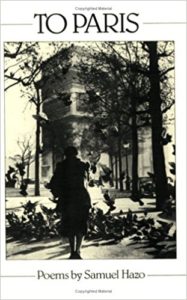
To Paris
Synopsis:
Reading To Paris, Samuel Hazo’s newest book of poems is an act of exploration, a search for an American-ness that can be felt in one’s self only while abroad. And what is discovered is not the alienation born of internal exile but a widening sense of humanity defined by tensions between time and place: now and then, here and now. “The Paris in this book,” Hazo explains, “is not merely a matter of geography, it is also what Paris means in history, and above all, what it can be imagined to mean. Call it the Paris of the mind or even the Paris in the blood- a certain freedom for the arts, for poetry, for life itself regardless of contradiction or even of consequence. In a sense, To Paris, for me, is both a directional signal and a toast.”
Here then are honest and courageous poems whose straightforward cadences are attuned to the familiar modulations of American speech. Hazo’s voice, in the words of Archibald MacLeish, “has found the case to speak the ‘You’ who is both ‘He’ and ‘I’- reminding us of what we always knew about ourselves but had forgotten to remember.
Review:
“A remarkable command of idiom, of sound and language… the work of a superlative craftsman who has genuine poetic sensibility.”
-Minnesota Review
Purchase Book on Amazon
Once for the Last Bandit: New and Lost Poems
Synopsis:
Half of this omnibus volume contains Samuel Hazo’s new book-length poem, Once for the Last Bandit, which he describes as a wordsmith’s aide-mémoire or an almanac of a penman in transit. The balance of the collection is comprised of the poet’s choices from his earlier five books.
Review:
“With a language as tight and hard as the best ‘metaphysical’ poets, Hazo examines himself and the living world around him with an understanding of its mutable tragedy, but with deep faith, questioning at times but always real.”
-The Virginia Quarterly Review
Purchase Book on Amazon
